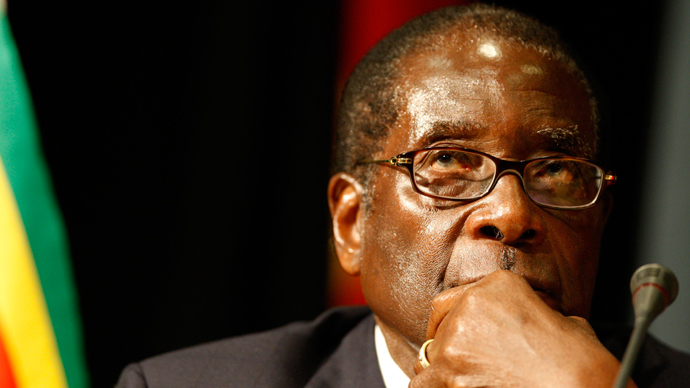Mugabe victory in Zimbabwe: Dictatorship or decolonization?

With another 5 years in power, Mugabe promises to expand his “indigenization” policy, whose failure would beget a drying up of foreign investment and increased economic isolation.
After Robert Mugabe has secured another five-year term as president of Zimbabwe, his self-empowerment policy, which gives black Zimbabweans a 51 percent stake in all existing foreign owned businesses, will hopefully inspire a regional shift towards pro-indigenization policies.
Few modern African leaders have been both so passionately supported and endlessly condemned as President Robert Mugabe, an ardent nationalist and black liberation figure who has ruled Zimbabwe since its independence in 1980. Despite the hardships and crippling hyperinflation brought on by Western sanctions as a result of ethnically polarizing land reform policies, Mugabe’s legacy as the country’s national liberator – as the man who laid down the core demands for national independence, and won – provokes an intense national fervor that has secured his victory in every election. It wasn’t so long ago that every inch of Zimbabwe, once known as “Rhodesia” after the British mining magnet Cecil Rhodes, was owned by a clique of white colonialists who made up 4.3 percent of the population. The masses of black Africans were brutally enslaved and forced to live under punishing exploitation, while Zimbabwe’s land and natural resources were taken violently and divided amongst European settlers.
The landslide victory of Mugabe in late July 2013 elections suggests that much of the population views him as the answer to the post-independence “black man's burden” – reaping meager profits from resources exploited by multinationals while continuing to be subservient to non-Africans who monopolize the continent’s most arable land. Mugabe’s ideology is that political independence is merely nominal without economic freedom, and thus argued during liberation negotiations in 1979 that Zimbabwe would only agree to a “willing buyer, willing seller” agreement provided that the United Kingdom offer black Zimbabweans the funds needed to purchase land forcibly taken from them by white landowners. The problem was that the UK never committed to the pledge made by Margaret Thatcher's government to raise hundreds of millions of pounds for long-term land reform, and many white landowners were unwilling to sell their land, which kept nearly the entire black population confined to less than a quarter of the country’s landmass.

Africa’s Hitler?
In 2000, in the midst of gouging austerity measures imposed by
the IMF, Mugabe’s ZANU-PF party did what no other
post-independence government has dared to do – it fast tracked
its indigenization policies, leading to the forcible seizure of
white-owned land, sometimes by violent means. Some 6,000 white
farmers were replaced by 245,000 black farmers, and while the
move initially created chaos and earned Mugabe titles like
“Africa’s Hitler,” agricultural production has normalized
to 1990s levels, and resettled farmers grow 40% of the country’s
tobacco and 49% of its maize. Today however, Saviour Kasukuwere,
Zimbabwe's minister of indigenization, admits food production is
only at about 50 percent of capacity, and there is no doubt that
major challenges still need to be overcome before the land
reforms can be seen as a viable policy for its neighbors to
emulate. International condemnation and crippling sanctions only
added to the chaos following the land seizures, resulting in a
hyperinflationary crisis that saw the printing of
one-hundred-trillion-dollar banknotes, and finally the
abolishment of the national currency in favor of the US dollar
and the South African rand.
Although there have been undeniable economic consequences, such as the loss of the national currency and monetary sovereignty, and sanctions imposed from European capitals as a result of the indigenization policies, the latest round of elections were essentially a public referendum on Mugabe’s policies, which the majority of Zimbabweans feel is the only effective way to lift the centuries’ old burden of European dominance and bring about genuine decolonization. At President Mugabe's final campaign rally, he proclaimed that, “we must re-write the economic books for our children. Those books were written to suite the West's agenda of exploiting our resources. Our children must know that our resources are more significant, more precious than their capital.” ZANU-PF’s next moves are to grant Zimbabweans at least 51% of controlling equity in foreign-owned businesses, resulting in what the party says will create a value of US$7.3 billion across 14 key sectors of the economy. Mugabe’s party is also planning a $5 billion investment in physical infrastructure including the energy, roads, and railway sectors, as well as in areas concerning health, education, housing, water, sanitation and security.

‘Make their economy scream’
Morgan Tsvangirai, the leader of the MDC-T (Movement for
Democratic Change) and former prime minister under the coalition
government, declared the vote a sham even prior to the results
being tallied. Mugabe, who won 61.09 percent of the vote to Mr.
Tsvangirai’s 33.94 percent, refused to allow election observers
from Western countries to monitor the polls. Despite claims from
the opposition to the contrary, the United Nations, the African
Union and other observer groups found the election results to be
sound, free, and fair. The only countries that have not
recognized the vote results are the UK, Australia, and the United
States – Secretary of State John Kerry claimed that the results
did not reflect “a credible expression of the will of the
Zimbabwean people,” an incredibly deceitful statement given
the groundswell and undeniable campaign surge around ZANU-PF,
further putting the Obama administration at odds with the
political judgment of both international and African
institutions.
There is good reason why the West backed Tsvangirai to the hilt –
he espoused an economic program that represents the direct
opposite of Mugabe’s indigenization policies. MDC-T championed a
foreign-investment-led growth agenda, promising one million new
jobs by 2018, reestablished relations with the West, a
repositioning of the country as being “ready for
business,” as well as renewing relations with the
international financial community. Tsvangirai has been a
consistent opponent of indigenization, land reform, and even
opposed the nationalization of the lucrative mining sector – his
poor showing in the polls reflects his endorsement of unpopular
neoliberal policies. Tsvangirai lost significant public support
in Zimbabwe after WikiLeaks documents showed that he urged the US
to maintain sanctions against the country, while taking the
opposite position in public. In a statement to the UN Office of
the High Commissioner for Human Rights protesting the economic
embargo, a Zimbabwean delegation made the case that they were
being unjustly sanctioned, citing former US Assistant Secretary
of State for African Affairs Chester Crocker, who told the US
Senate that, “To separate the Zimbabwean people from Zanu PF,
we are going to have to make their economy scream, and I hope
you, Senators, have the stomach for what you have to do.”
WikiLeaks cables also revealed statements made by former US Ambassador to Zimbabwe Christopher Dell, who said, “He [Tsvangirai] is the indispensable element for regime change, but possibly an albatross around their necks once in power.” Tsvangirai may have convinced many of the youth and downtrodden in Zimbabwe that his was the right agenda, but the significant majority clearly isn’t buying it.

Indigenization blowback: Will Chinese investors be deterred?
From 2008, Zimbabwe operated under a coalition government with
Mugabe as its president and Tsvangirai as prime minister. Given
ZANU-PF’s strong mandate and two-thirds majority in parliament,
however, it is again firmly in the driver’s seat and set on
making the country’s most ambitious indigenization reforms yet.
In this light, it can only be expected that Western pressure will
be redoubled in an effort to sabotage coming reforms, in fear of
other African countries emulating them if they yield success.
The last thing multinationals want is for other African leaders to look at Zimbabwe and Mugabe as a positive point of reference. One consequence of indigenization reforms may result in a sharp decline in capital inflows and foreign-investment, simply because few investors, be they from the West or elsewhere, want to be stripped of half a business after pouring in the capital and know-how. Just as the land seizures created short-term instability and eventual normalization, there is a strong possibility that further reforms will create turbulence and economic insecurity if ZANU-PF fails to ensure a smooth and harmonized investment environment. That foreign-investment in the first quarter of 2013 amounted to approximately $36 million, compared to about $136 million in the same period in 2012 is telling.
China is the main international supporter of Zimbabwe, and Beijing has backed Mugabe since the pre-independence days, during the Rhodesian Bush War in 1979. Since the diplomatic fallout with the West, Mugabe has relied on a “Look East” policy that offered priority to Chinese investment and capital from other Asian states. China, with its insatiable appetite for cigarettes, is the biggest buyer of Zimbabwean tobacco, and has sold Harare millions worth of military hardware. Beijing has furthermore spearheaded development projects which include everything from developing hydroelectric power to financing local cotton production.
The Chinese government has sent an observer mission to monitor
the recent elections, which noted that the voting process
proceeded smoothly, and that China “appreciates the Zimbabwean
people's patriotic zeal and independent consciousness.”
Investment from China fell from $1 billion in 2011 to $667
million in 2012, and similar trends have followed between
Harare’s key trading partners like South Africa. The challenge
ahead will be ensuring key partners that the country’s investment
climate will remain stable during the process of democratizing
the economic space, which should be done with care.
The statements, views and opinions expressed in this column are solely those of the author and do not necessarily represent those of RT.
The statements, views and opinions expressed in this column are solely those of the author and do not necessarily represent those of RT.













